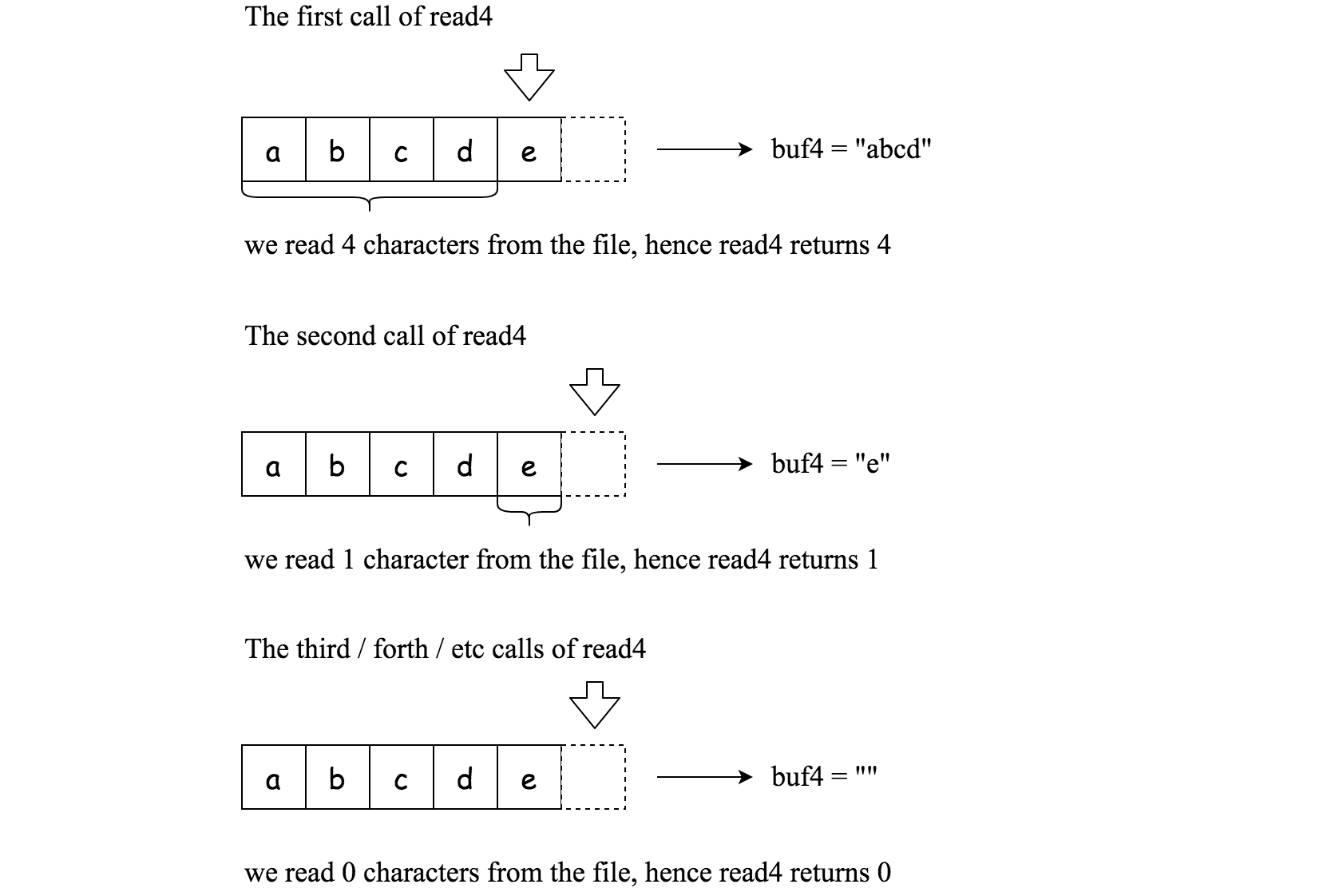[LeetCode] 158. Read N Characters Given Read4 II - Call multiple times_Hard tag: array, queue
2021-08-09 11:23 Johnson_强生仔仔 阅读(39) 评论(0) 编辑 收藏 举报Given a file and assume that you can only read the file using a given method read4, implement a method read to read n characters. Your method read may be called multiple times.
Method read4:
The API read4 reads four consecutive characters from file, then writes those characters into the buffer array buf4.
The return value is the number of actual characters read.
Note that read4() has its own file pointer, much like FILE *fp in C.
Definition of read4:
Parameter: char[] buf4
Returns: int
buf4[] is a destination, not a source. The results from read4 will be copied to buf4[].
Below is a high-level example of how read4 works:

File file("abcde"); // File is "abcde", initially file pointer (fp) points to 'a'
char[] buf4 = new char[4]; // Create buffer with enough space to store characters
read4(buf4); // read4 returns 4. Now buf4 = "abcd", fp points to 'e'
read4(buf4); // read4 returns 1. Now buf4 = "e", fp points to end of file
read4(buf4); // read4 returns 0. Now buf4 = "", fp points to end of file
Method read:
By using the read4 method, implement the method read that reads n characters from file and store it in the buffer array buf. Consider that you cannot manipulate file directly.
The return value is the number of actual characters read.
Definition of read:
Parameters: char[] buf, int n
Returns: int
buf[] is a destination, not a source. You will need to write the results to buf[].
Note:
- Consider that you cannot manipulate the file directly. The file is only accessible for
read4but not forread. - The read function may be called multiple times.
- Please remember to RESET your class variables declared in Solution, as static/class variables are persisted across multiple test cases. Please see here for more details.
- You may assume the destination buffer array,
buf, is guaranteed to have enough space for storingncharacters. - It is guaranteed that in a given test case the same buffer
bufis called byread.
Example 1:
Input: file = "abc", queries = [1,2,1]
Output: [1,2,0]
Explanation: The test case represents the following scenario:
File file("abc");
Solution sol;
sol.read(buf, 1); // After calling your read method, buf should contain "a". We read a total of 1 character from the file, so return 1.
sol.read(buf, 2); // Now buf should contain "bc". We read a total of 2 characters from the file, so return 2.
sol.read(buf, 1); // We have reached the end of file, no more characters can be read. So return 0.
Assume buf is allocated and guaranteed to have enough space for storing all characters from the file.
Example 2:
Input: file = "abc", queries = [4,1]
Output: [3,0]
Explanation: The test case represents the following scenario:
File file("abc");
Solution sol;
sol.read(buf, 4); // After calling your read method, buf should contain "abc". We read a total of 3 characters from the file, so return 3.
sol.read(buf, 1); // We have reached the end of file, no more characters can be read. So return 0.
Constraints:
1 <= file.length <= 500fileconsist of English letters and digits.1 <= queries.length <= 101 <= queries[i] <= 500
Ideas:
1. 还是利用[LeetCode] 157. Read N Characters Given Read4_Easy tag: array的思路
2. 只不过每次不用从buf4或者说read4来得到,而是用一个self.queue,相当于cache来存之前还没有读完的char
3. 建一个helper function,每次cache为空的时候就update一下,如果还为空表明file已经到头了
4. 另外用一个file_not_finish 来作为flag看file到头没
Code:
# The read4 API is already defined for you. # def read4(buf4: List[str]) -> int: class Solution: def __init__(self): self.queue = collections.deque() self.file_not_finish = True def read(self, buf: List[str], n: int) -> int: num_chars = 0 while num_chars < n: self.updateQueue() num_queue = len(self.queue) for i in range(num_queue): if num_chars == n: return num_chars buf[num_chars] = self.queue.popleft() num_chars += 1 if not num_queue: return num_chars return num_chars def updateQueue(self): if not self.queue and self.file_not_finish: buf4 = [""] * 4 num_read4_chars = read4(buf4) for i in range(num_read4_chars): self.queue.append(buf4[i]) if num_read4_chars < 4: self.file_not_finish = False



